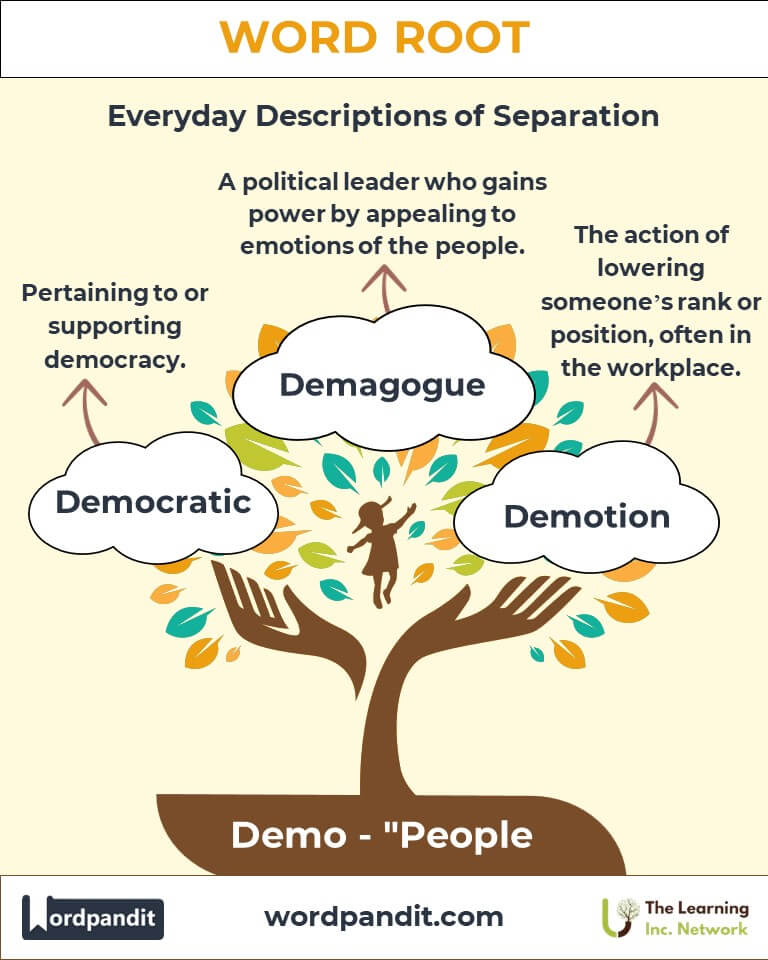Demo: Understanding the Power of People and Populations
Explore the origins, meanings, and applications of the Greek root "Demo," meaning "people." From ancient democratic ideals to modern demography and epidemiology, uncover how this root shapes words that define human societies, governance, and collective identities.

Table of Contents
- Introduction: The Power of the People
- Etymology and Historical Journey
- Mnemonic: Unlocking the Power of Demo
- Common Demo-Related Terms
- Demo Through Time
- Demo in Specialized Fields
- Illustrative Story: Demo in Action
- Cultural Significance of the Demo Root
- The Demo Family Tree
- FAQs About the Demo Word Root
- Test Your Knowledge: Demo Mastery Quiz
- Conclusion: The Living Legacy of Demo
Introduction: The Power of the People
What does it mean to truly represent the voice of the people? The Greek root "Demo," derived from demos (meaning "people"), serves as the foundation for words that delve into societal structures, governance, and collective identities. Its influence permeates words like "democracy," "demography," and "demagogue," shaping discussions about governance, population studies, and human behavior.

Etymology and Historical Journey
The root "Demo" finds its origins in Ancient Greek, where demos referred to "the people" or "a populace." In governance, demos symbolized the collective voice of citizens. Ancient Athens, famed for its democratic innovations, immortalized the term through the establishment of democracy (demo meaning "people" and -cracy meaning "rule").
Mnemonic: Unlocking the Power of Demo
To remember "Demo," visualize a bustling crowd in a public square, their collective voices shaping the rules and decisions of society.
Mnemonic Device: "Demo means people unite—together, they write their destiny."
Common Demo-Related Terms
- Democracy: Governance by the people. Example: "Ancient Greece introduced democracy, allowing citizens to vote on major decisions."
- Demographic: Relating to the structure of populations. Example: "Marketers use demographic data to target specific age groups."
- Demagogue: A leader who gains power by exploiting popular emotions. Example: "The politician’s fiery rhetoric painted him as a demagogue rather than a unifier."
- Demotic: Pertaining to ordinary people or everyday language. Example: "The writer’s demotic style made her work accessible to a broad audience."
- Demography: The statistical study of populations. Example: "Researchers in demography analyze birth and death rates to predict societal trends."
Demo Through Time
Democracy: From direct governance by citizens in Athens to modern representative democracies.
Demography: From counting populations for governance to analyzing societal shifts in migration and urbanization.
Demo in Specialized Fields
- Epidemiology: Combining "Demo" (people) and "logy" (study) to track diseases within populations.
- Marketing: Demographic analysis helps businesses tailor products for specific groups.
- Economics: "Demoeconomy" examines how population structures impact financial systems.
Illustrative Story: Demo in Action
Dr. Elena Voss, an epidemiologist, used demographic and epidemiological data during a viral outbreak in a densely populated city. Her strategic decisions saved countless lives, emphasizing the importance of "Demo"-rooted sciences.
Cultural Significance of the Demo Root
- Ancient Greece: Symbolized citizens’ rights and governance.
- Modern Populism: Demonstrates the power of collective will in politics.
- Media: Reflects struggles and triumphs in governance.

The Demo Family Tree
- Popul-: Population, Populist.
- Ethno-: Ethnography, Ethnology.
- Soci-: Society, Sociologist.
FAQs About the Demo Word Root
Q: What does "Demo" mean in modern English?
A: "Demo" means "people" and is commonly used in words that relate to populations, governance, and societal structures.
Q: What is the origin of the root "Demo"?
A: The root "Demo" originates from the Ancient Greek word demos, meaning "the people" or "populace."
Q: How is demography different from demographics?
A: Demography is the statistical study of populations, including their size, structure, and dynamics. Demographics refer to specific data sets or characteristics of a population, such as age, gender, and income.
Q: What role does "Demo" play in marketing?
A: In marketing, "Demo" appears in "demographics," which are used to identify and target specific audience segments based on their characteristics.
Q: What does the word "Demagogue" mean?
A: A "demagogue" is a leader who seeks power by appealing to popular desires and prejudices rather than rational arguments. The term often carries a negative connotation.
Test Your Knowledge: Demo Mastery Quiz
1. What is the meaning of the root "Demo"?
2. Which word describes a leader who manipulates people’s emotions to gain power?
3. What is the study of populations called?
4. Which term refers to everyday language or the common people?
5. What Greek root combines with "Demo" to mean "government by the people"?

Conclusion: The Living Legacy of Demo
The root "Demo" continues to shape our understanding of societies, governance, and population dynamics. Its evolution from ancient ideals to modern disciplines underscores its enduring relevance in improving human experiences.













